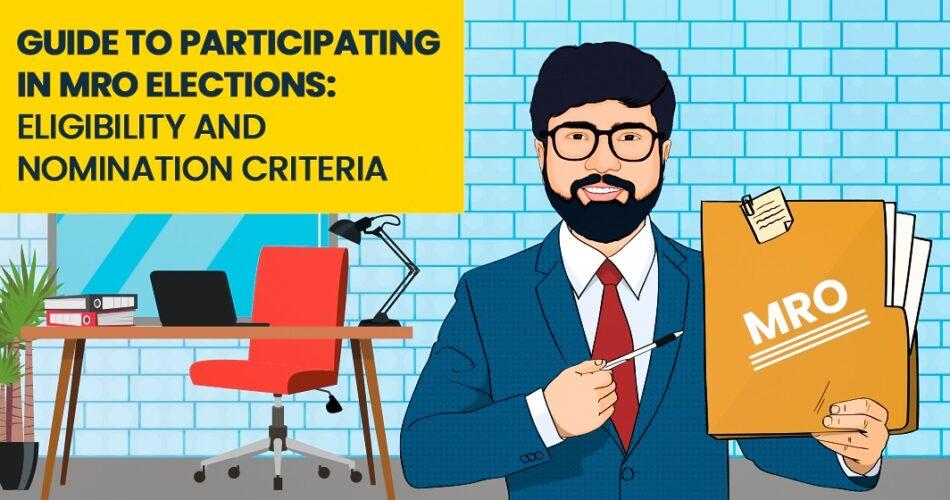Learn about the eligibility and nomination criteria for Mandal Revenue Officer (MRO) elections in India. Find out how to participate in the election process, including filing nominations, campaigning, and the counting of votes. Discover recent examples from Indian Politics and how you can contribute to the democratic process.
Welcome to the ultimate guide to participating in MRO elections in India! Here, we will cover everything you need to know about the eligibility and nomination criteria for MRO elections. MRO stands for Mandal Revenue Officer, who is responsible for maintaining the land records and revenue administration in a Mandal or a sub-district in India. MRO elections are held periodically to elect the Mandal Revenue Officer for a particular Mandal.
Eligibility Criteria for MRO Elections
To be eligible to contest in MRO elections, a candidate must meet the following criteria:
Age Limit: The candidate must be at least 25 years old.
Educational Qualification: The candidate must have completed a minimum of intermediate education (12th standard) from a recognized board or university.
Citizenship: The Candidate must be a citizen of India.
Residency: The candidate must be a resident of the Mandal or the sub-district for which the MRO elections are being held.
Nomination Criteria for MRO Elections
To contest in the MRO elections, a candidate must be nominated by a registered political party or an independent candidate. The following are the nomination criteria for MRO elections:
Nomination Form: The candidate must submit a nomination form to the Mandal Revenue Officer along with the required documents.
Security Deposit: The candidate must deposit a security amount of Rs. 5000/- in the form of a demand draft or a treasury challan at the time of submitting the nomination form. This amount is refundable if the candidate secures a minimum of one-sixth of the total valid votes polled in the election.
Proposers and Seconders: The candidate must be proposed and seconded by two registered voters of the Mandal or the sub-district for which the MRO elections are being held.
Affidavit: The candidate must submit an affidavit declaring that he/she meets all the eligibility criteria and has not been convicted of any criminal offence.
Election Process
The Election Process is a crucial aspect of the MRO elections, and it is important for candidates and voters to understand the process in detail. Here’s a breakdown of the various stages involved in the MRO election process:
Notification: The first stage of the election process is the notification by the Election Commission. The Commission announces the date of filing nominations, the last date for filing nominations, the date for scrutiny of nominations, and the date of polling.
Filing Nominations: Candidates who meet the eligibility criteria can file their nominations during the specified period. The candidate must submit the nomination form along with the required documents and the security deposit of Rs. 5000/-.
Scrutiny of Nominations: After the last date of filing nominations, the Election Commission scrutinises the nominations to check if the candidates meet the eligibility criteria and have submitted all the required documents.
Withdrawal of Candidature: After the scrutiny of nominations, candidates can withdraw their candidature before the date of polling if they wish to do so.
Campaigning: Candidates who have filed their nominations and their candidature has been accepted can start their campaign. They can use various campaign strategies to reach out to voters and convince them to vote for them.
Polling: On the date of polling, registered voters can cast their votes at the designated polling booths. The Election Commission ensures that the polling is conducted in a free and fair manner.
Counting of Votes: After the polling is over, the counting of votes takes place. The Election Commission appoints a Returning Officer to oversee the counting process. The candidate who secures the highest number of votes is declared the winner.
Recent Examples from Indian Politics
The MRO elections are an important part of the Indian Political Landscape, and they often witness intense competition among political parties and candidates. In the recent past, we have seen several instances where MRO elections have been fiercely contested.
For example, in the 2019 MRO elections held in Andhra Pradesh, the ruling party, Telugu Desam Party (TDP), faced a tough challenge from the opposition party, YSR Congress. The YSR Congress won a majority of the MRO seats, reflecting the growing popularity of the party among the masses.
Similarly, in the 2020 MRO elections held in Telangana, the ruling party, Telangana Rashtra Samithi (TRS), emerged as the clear winner, winning a majority of the MRO seats. The opposition parties, including the Congress and the Bharatiya Janata Party (BJP), put up a tough fight but could not prevent the TRS from securing a comfortable victory.
Conclusion
Participating in MRO elections is a great way to contribute to the democratic process in India. If you meet the eligibility criteria and are interested in contesting in the MRO elections, make sure to submit the nomination form along with the required documents before the deadline. With the right preparation and campaign strategy, you can increase your chances of winning the MRO elections and serving the people of your Mandal or sub-district as the Mandal Revenue Officer.
Partner with Political Engineer for a winning campaign in the MRO Elections. Let us create a compelling digital identity for you and help you connect with voters on social media like never before. Trust us to deliver results and make your campaign a success. Contact us now to get started!
 Follow us for more updates on LinkedIn
Follow us for more updates on LinkedIn
Get more interesting stuff on our official portal. Visit us on:
https://www.politicalengineer.in

